(November 19, 2024) Michigan’s beloved birds, including the Great Lakes Piping Plover and Common Loon, are facing growing threats to their survival. Wetland loss and climate change are pushing these iconic species toward extinction—but there’s hope.
On Wednesday, November 13, Grand Rapids residents joined Audubon Great Lakes and the Grand Rapids Audubon Club for Birds and Brews at Mitten Brewing Company to learn about Michigan’s birds, the environmental threats they face, and the policy solutions that will protect them.
During the event we were joined by local conservation and policy experts Sergio Cira-Reyes, Climate Justice Catalyst at Urban Core Collective; Travis Kurtz, Community Science Coordinator at John Ball Zoo; and Kylie McElrath, Michigan Conservation Manager at Audubon Great Lakes.
Wetlands Protection & Climate Change Solutions Critical for Birds

Michigan has lost 50 percent of its historic wetlands, vital for the survival of bird species like the state-threatened Black Tern. By restoring wetlands, we’re not only protecting birds but also strengthening Michigan communities against flooding, erosion, and other climate impacts.
That’s important because more than two-thirds of North American bird species, including over half of Michigan’s bird population, are at risk of extinction from climate change.
Wetlands are critical for birds. We’re working with local organizations at vital sites like Ottawa Sands County Park in Ferrysburg, Michigan, to give these birds a fighting chance.
Last month, we celebrated the grand reopening of Ottawa Sands County Park where we completed a restoration project to enhance shoreline habitat and restore wetlands for birds and countless other wildlife with partners Ottawa County Parks and Recreation, Michigan Department of Natural Resources and others. Ottawa Sands falls within one of our twelve priority regions for wetlands restoration for marsh bird conservation and a globally recognized Audubon Important Bird Area.
We’ve also celebrated some recent policy wins in Michigan. The FY25 Michigan state budget included nearly $15 million in funding for wetlands restoration and conservation. Audubon Great Lakes also worked with partners to pass the Clean Energy Future Package, which will accelerate the deployment of responsibly sited renewable energy sources, expand energy efficiency programs and require that impacts on marginalized communities are considered in these plans. These efforts will help create a safer future for climate-vulnerable birds like the Black Tern.
Take Action to Protect Michigan’s Birds

Continuing to advance strong policies to protect wetlands and address climate change will help ensure a resilient future for Michigan birds.
Thank you to Grand Rapids residents for joining us for Birds and Brews to learn about opportunities to protect Michigan’s birds and communities. Join us as we advance solutions to protect Michigan birds. Sign up today to be a climate advocate and we’ll reach out with opportunities to take action.






